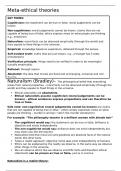Meta-ethical theories
KEY TERMS:
Cognitivism: the statement can be true or false, moral judgements can be
known
Non-cognitivism: moral judgements cannot be known, claims that are not
capable of being true of false, ethics express views on what people are thinking
e.g., emotivism.
Naturalism: moral facts can be observed empirically (through the world) and
they equate to fixed things in the universe.
Empirical: knowledge based on experience, obtained through the senses.
Self-evident truth: truths that are just known, e.g., a triangle has 3 sides
(intuitionism)
Verification principle: things need to be verified in order to be meaningful
(usually empirically).
Rational: through reason
Absolutist: the idea that morals are fixed and unchanging, universal and non-
flexible.
Naturalism (Bradley)– The philosophical belief that everything
arises from natural properties – moral facts can be observed empirically (through the
world) and they equate to fixed things in the universe.
Ethical naturalists are absolutists.
Ethical naturalists assume cognitivism (moral judgements can be
known) – ethical sentences express propositions and can therefore be
true or false.
Side note: non-cognitivism (moral judgements cannot be known) are claims
that are not capable of being true or false – ethics simply expresses views on what
people are thinking – murder is wrong= I don’t like murder (emotivism)
For example: “The philosophy teacher is a brilliant woman with blonde hair”
- The cognitivist would say: the statement can be true or false, brilliance is
objective and exists independently
- The non-cognitivist would say: brilliance does not exist independently but
may mean you like the teacher.
Naturalists hold that moral evil and goodness are absolute facts of the natural
world, like other facts.
Takes a realist approach: objective moral laws exist independently of humans
Ethics can be explained by the reality we observe, in the same way we observe
other things in the universe.
We can observe ethics like we observe scientific facts and therefore ethical
statements can be proven as true or false, just as in science.
Naturalism is a realist theory:
, Moral realism: Believing that moral facts or truths actually exist. There are mind-
independent, external moral properties and facts – e.g., “murder is wrong” is a moral
fact because the act of murder has the moral property of wrongness
Moral anti-realism: Mind-independent moral properties and facts do not exist.
- Realist metaethical theories argue that mind-independent moral properties such
as ‘right’, ‘wrong’, ‘good’, ‘bad’ exist.
- These moral properties give rise to moral facts, such as ‘murder is wrong’.
- A realist would say murder has the same property of wrongness in the same
way grass has the property of greenness.
The difference between realism and cognitivism:
Realism/anti-realism is about whether or not mind-independent moral
properties exist
Cognitivism/non-cognitivism is about what people mean when they make moral
judgements
- So, ethical naturalism says that moral judgements are beliefs that are
intended to be true or false (cognitivism) and that moral properties exist
(realism) and are natural properties.
- So, according to ethical naturalism, ‘murder is wrong’ expresses a cognitive
belief that murder is wrong- where ‘wrong’ refers to a natural property.
There are two types of naturalist theories:
1. Hedonic naturalists – link goodness to pleasure or happiness – moral
statements are justified by some other thing. Bentham would say that we can
discover right and wrong by discovering what actions lead to pleasure or pain.
By observing that stabbing someone causes them pain, we can infer
that this action is wrong.
Problem: you could justify killing by saying it causes you pleasure – link to
utilitarianism.
2. Theological naturalists – For example, Aquinas, link goodness to the divine
will and the kind of creatures God has made humans to be. For these creatures,
adultery is wrong as it prevents human flourishing. The world has a God-given
order built into it. Moral values can be worked out by understanding our
God-given purpose and observing the natural order.
Problem: How do we know God’s divine will – Bonhoeffer?
3. Bradley – argued that it is possible to understand our moral duties by
observing our position in life. It could be argued that certain roles, for example,
teacher, nurse, mother or brother, do seem to have certain duties or moral
values attached to them.
UTILITARIANISM AS NATURALISM:
o Utilitarianism is perhaps the obvious example of a naturalist ethical theory.
o It says ‘good’ can be reduced to pleasure, and ‘bad’ can be reduced to pain.




